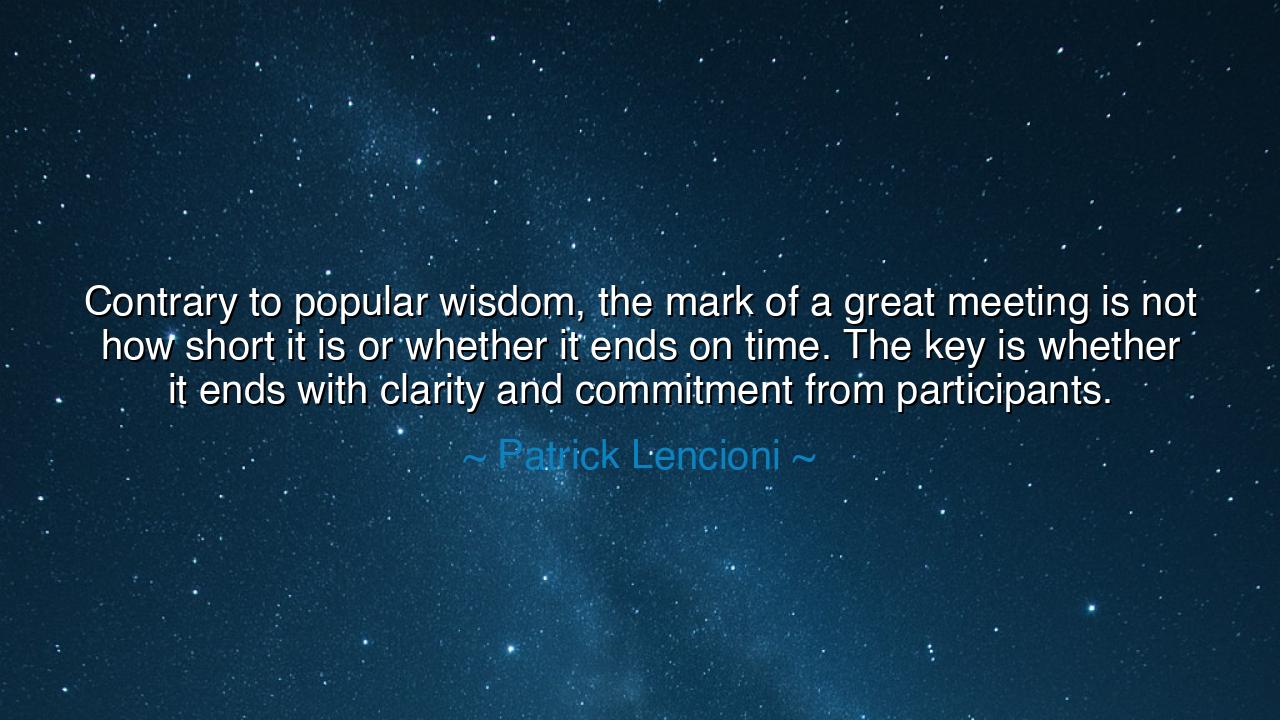
Contrary to popular wisdom, the mark of a great meeting is not
Contrary to popular wisdom, the mark of a great meeting is not how short it is or whether it ends on time. The key is whether it ends with clarity and commitment from participants.






Hear me, O children of the future, for I bring to you the wisdom of Patrick Lencioni, who declares: "Contrary to popular wisdom, the mark of a great meeting is not how short it is or whether it ends on time. The key is whether it ends with clarity and commitment from participants." These words challenge the common understanding of what constitutes a successful gathering. Many may believe that a meeting is good if it is brief and punctual, yet these are mere appearances. True success lies not in the length of time spent together, but in the purposeful action taken at its close.
Consider the ancient councils of wise men who gathered to shape the fate of their people. It was not the brevity of their deliberations that marked their greatness, but the clarity with which they reached decisions. The Athenian Assembly, for example, did not always end swiftly, but its value lay in the commitment to the principles of democracy and the shared responsibility to act upon the decisions made. In the great debates of ancient times, leaders understood that wisdom was not found in rushing through discussions but in the clarity and commitment with which those discussions were brought to a meaningful conclusion.
In more recent history, the United States' founding fathers embodied this principle in their deliberations over the Constitution. The debates that took place in Philadelphia were not brief nor easy; they lasted for months, filled with disagreement and doubt. Yet, what made the gathering great was not its speed, but the clarity with which the delegates eventually agreed on a framework for a new nation. The commitment to the ideals of liberty, equality, and justice was the fruit of these long deliberations, not the result of a swift and inconsequential meeting. The true mark of their work was in the strength of their collective action after the meeting had ended.
Think also of the wartime councils of leaders, such as those during World War II. The meetings between Churchill, Roosevelt, and Stalin were often long and fraught with tension, but they produced the clarity needed to guide the world through one of its darkest hours. The commitment forged in those meetings became the backbone of the Allied victory, proving that the true measure of a gathering lies not in its efficiency but in the clarity and commitment that emerge from the participants, which shape the future of nations.
So, O children, understand this: the mark of a great meeting is not the fleeting nature of time, but the power of the decisions that arise from it. Let clarity and commitment be your guiding principles in every gathering, whether in councils of state or in the simple meetings of daily life. Wisdom is not in the rush to finish but in the strength of the conclusions drawn and the action taken thereafter. A meeting that ends with purpose, with a shared understanding of the path ahead, is a meeting that will endure in the legacy of its outcomes. Let your gatherings, however long they may be, bear the fruit of meaningful change, and may your commitment to the task at hand shape the world for generations to come.






TLDao thanh long
I’ve often thought of a successful meeting as one that sticks to a schedule and avoids wasting time, but Lencioni’s quote challenges that. He makes a good point about the importance of clarity and commitment. But what happens if participants aren’t willing to engage or provide commitment? How do you make sure that all voices are heard, and that the commitment isn’t just from the loudest people in the room?
VADang Thi Van Anh
Lencioni’s quote is an eye-opener for me because I’ve always associated ‘short and sweet’ with meeting success. But this idea of clarity and commitment being the key really resonates. However, how do we ensure that all participants stay fully engaged to achieve that clarity? Is it the responsibility of the leader, or should the participants themselves take more ownership of their involvement? Can we really expect everyone to be committed during long or challenging discussions?
NL46-Thao Vy Nguyen Lo
This perspective on meetings really makes sense. We often rush through meetings trying to check the box of ‘ending on time,’ but without clarity and real engagement, it's pointless. I do wonder, though, about the challenge of keeping people focused and committed without dragging the meeting on unnecessarily. What strategies could be implemented to ensure that meetings are both clear and concise, and not just about meeting time limits?
DDat
I really like how Patrick Lencioni challenges the typical view of what makes a meeting successful. It’s so common to think that a meeting is good just because it’s short or ends on time, but those things don’t necessarily equate to productivity. I wonder, though, how do we balance the need for clarity and commitment with the pressure to keep meetings brief and efficient in today’s fast-paced work environment? Can they coexist?